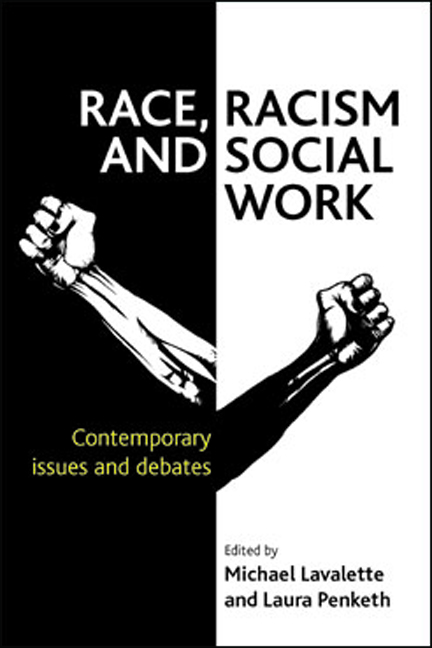Book contents
- Frontmatter
- Contents
- Notes on contributors
- Acknowledgements
- Dedication
- Some terms and definitions
- Introduction: Race, racism and social work
- one Rethinking anti-racist social work in a neoliberal age
- two The growth of xeno-racism and Islamophobia in Britain
- three The catalysers: ‘black’ professionals and the anti-racist movement
- four “Same, same, but different”
- five Antisemitism and anti-racist social work
- six Anti-Roma racism in Europe: past and recent perspectives
- seven In defence of multiculturalism?
- eight Social work and Islamophobia: identity formation among second and third generation Muslim women in north-west England
- nine Institutionalised Islamophobia and the ‘Prevent’ agenda: ‘winning hearts and minds’ or welfare as surveillance and control?
- ten ‘Street-grooming’, sexual abuse and Islamophobia: an anatomy of the Rochdale abuse scandal
- eleven My people?
- twelve Twenty-first century eugenics? A case study about the Merton Test
- thirteen The role of immigration policies in the exploitation of migrant care workers: an ethnographic exploration
- Conclusion: Race, racism and social work today: some concluding thoughts
- Bibliography
- Index
Conclusion: Race, racism and social work today: some concluding thoughts
Published online by Cambridge University Press: 01 February 2022
- Frontmatter
- Contents
- Notes on contributors
- Acknowledgements
- Dedication
- Some terms and definitions
- Introduction: Race, racism and social work
- one Rethinking anti-racist social work in a neoliberal age
- two The growth of xeno-racism and Islamophobia in Britain
- three The catalysers: ‘black’ professionals and the anti-racist movement
- four “Same, same, but different”
- five Antisemitism and anti-racist social work
- six Anti-Roma racism in Europe: past and recent perspectives
- seven In defence of multiculturalism?
- eight Social work and Islamophobia: identity formation among second and third generation Muslim women in north-west England
- nine Institutionalised Islamophobia and the ‘Prevent’ agenda: ‘winning hearts and minds’ or welfare as surveillance and control?
- ten ‘Street-grooming’, sexual abuse and Islamophobia: an anatomy of the Rochdale abuse scandal
- eleven My people?
- twelve Twenty-first century eugenics? A case study about the Merton Test
- thirteen The role of immigration policies in the exploitation of migrant care workers: an ethnographic exploration
- Conclusion: Race, racism and social work today: some concluding thoughts
- Bibliography
- Index
Summary
The aim of the book has been to re-open debates about issues of ‘race’ and racism in modern Britain, and the relevance for those of us involved in social work education, training and practice. Racism is a deeply entrenched social problem, built into the structure of modern capitalist societies, but this does not mean that it is static and unchanging. At different moments in time the rhetoric of racism targets specific minority ethnic groups in particular ways: black and Asian communities, (white) East European migrants, members of the Roma community, Asylum seekers or members of the Muslim community, for example. Over the last 10–15 years the most visible form of racism has been the rise of Islamophobia, with increasing levels of racism directed against the Muslim community in Britain and across Europe. To say this, is not to deny or denigrate the racism felt by other minority communities, but it is to recognise the particular forms of institutional racism and violence that manifests itself in the form of physical and verbal attacks on Muslims and in the nature of political and media debates that are increasingly framed in terms of a perceived ‘problematic Muslim presence’ in Britain and Europe that demands some form of political action. What that action should be remains open to contestation.
As we were finishing the book issues of ‘race’, racism, Islamophobia and multiculturalism once again gained high levels of political, media and public attention with the brutal and horrific killing of soldier Lee Rigby in Woolwich, in London on 22 May 2013. This led to a questioning once again, of the place of Islam and the role of migration and multiculturalism within modern Britain. In the days following the attack there was little space for rational discussion, or attempts to understand why such terrible events might take place; or even to compare the horror in Woolwich with the (far less publicised) murder of 75-year-old Mohammed Saleem killed in Birmingham while on his way home from evening prayers on 29 April 2013. According to family and friends, this was a vicious racist killing of a man whose family had previously received threats from the far-right English Defence League (BBC 2013). Even in a simple way Mr Saleem's killing highlights the way in which media priorities can shape debate and understandings of social problems (something that Orr addresses in Chapter Ten on media portrayals of ‘grooming’).
- Type
- Chapter
- Information
- Race, Racism and Social WorkContemporary Issues and Debates, pp. 257 - 266Publisher: Bristol University PressPrint publication year: 2013



